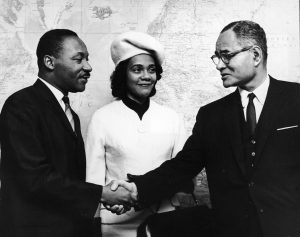Ralph Johnson Bunche, Nobel Prize winner, scholar and activist was born August 7, 1904, in Detroit, Michigan. His father worked in a barbershop that had a clientele of whites-only. His mother was an amateur musician and his grandmother, who lived with the family, was born into slavery. The family settled in Albuquerque, New Mexico when Bunche was 10 years old after his mother’s health began to decline.
Two years after moving to New Mexico, Bunche’s mother died and his grandmother took him and his two sisters to live in Los Angeles. He had to overcome economic difficulties and racial prejudice but continued to excel in academics. Bunche graduated as valedictorian in both high school and UCLA, where he was awarded a scholarship to complete graduate work at Harvard University.
He earned a master’s and doctoral degree in government and international relations from Harvard University (1928 and 1934). At Harvard, Bunche became the first African American to receive a Ph.D. in political science. He held the Rosenwald Fellowship from 1932-1933, which enabled him to research in Africa for a dissertation that would compare French rule in Togoland and Dahomey. His dissertation received the Toppan Prize for outstanding research.
Bunche began his career as a professor and civil rights activist at Howard University in 1928. While working at Howard, he became one of the leaders of a small group of radical Black intellectuals, who were dubbed The Young Turks by W.E.B. Du Bois. They argued that issues of class, not race were key to solving the problems in the African American community. He went on to reorganize and chair the Department of Political Science at Howard from 1928 until 1950.
In 1942, Bunche began his work as a diplomat by serving the United States and the United Nations. Bunche’s successful mediation in the Palestine conflict resulted in the signing of the Armistice Agreements in 1949 between Israel and four Arab states. His international diplomacy was unparalleled in the long history of the Arab-Israeli conflict. He won the 1950 Nobel Peace Prize, becoming the first person of color to win the award.

Bunche spoke out against racism in the U.S. despite his role at the United Nations. During the 1960s, he actively supported Martin Luther King Jr’s nonviolent methods and marched with King in the 1963 March on Washington. He also participated in the 1965 Selma-to-Montgomery Voting Rights March.
After suffering from a number of health conditions, including kidney and heart disease, Bunche died in New York City on December 9, 1971. During his career, he received more than four dozen honorary doctorate degrees and many awards, including the U.S. Medal of Freedom from former President John F. Kennedy.